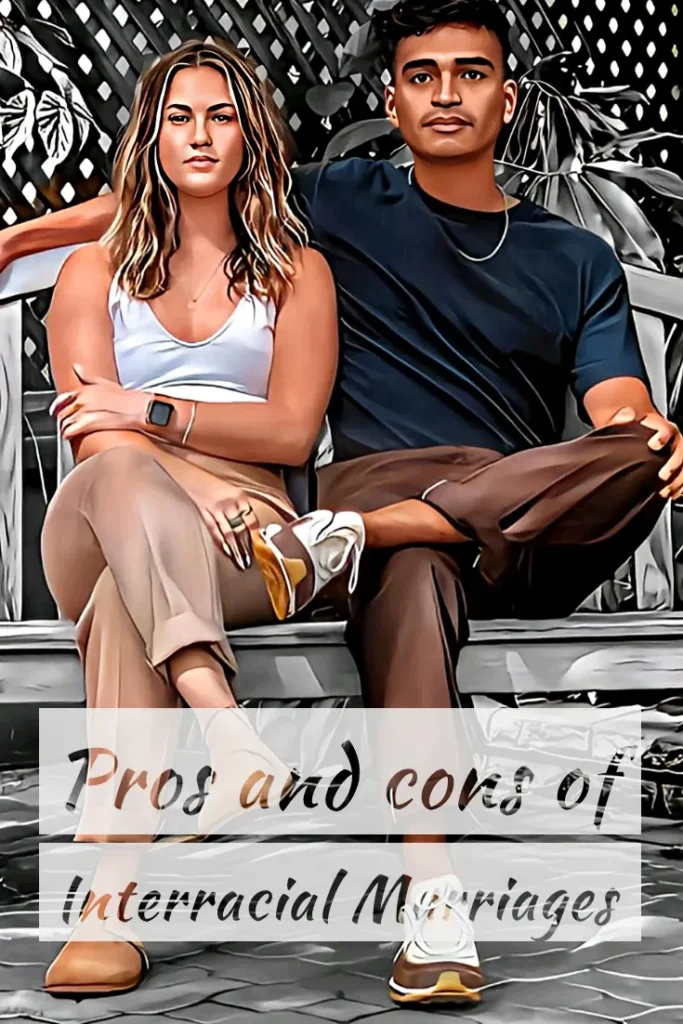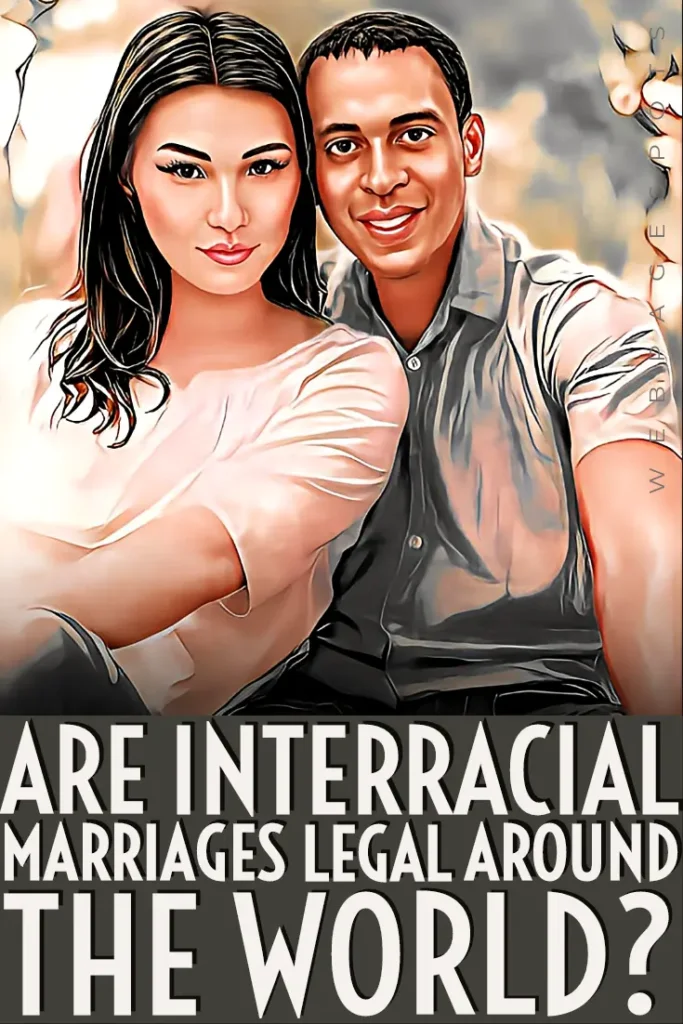Love knows no limits: 15 Interracial Relationships FAQs
This blog post may contain affiliate links. If we find a product or service to be useful, we encourage you to visit the website via that link. If you make a purchase through our referral link, we may receive a commission. Rest assured, you will not be charged any additional fees. By using these links, you can support us while making your purchase. For more information visit here.
Disclaimer: The intention of this article is to provide information and insights into interracial relationships in a respectful and inclusive manner. We do not intend it to offend or harm any individual, community, or cultural group. Love and relationships are personal choices, and we encourage everyone to make their own decisions based on mutual respect, understanding, and consent. We do not promote any faith or agenda and respect all cultures and backgrounds around the world.
15 Interracial relationships FAQs because love knows no limits
In a society where we shudder when seeing a foreigner, interracial couples are becoming more popular. While breaking down caste barriers and prioritizing love over societal standards can be tough, it is also a step towards a more inclusive and tolerant society.
Intercaste marriages question traditional marriage and love ideals. They pave the way for the next generation of people who value compatibility and mutual respect over caste and social standing.
While these couples continue to endure rejection and censure, they provide a ray of hope for a future where love knows no bounds. Now let’s continue with this essay and discover solutions to some of its questions.

What do you call an interracial relationship?
Interracial relationships occur when two people from different racial or ethnic backgrounds decide to be together or marry. They have intimate relationships and live lovingly. This might include anyone from black and white to East Asian and Latinx.
These relationships are a way for people to show love and affection for each other, regardless of cultural differences. Interracial relationships help break down stereotypes and promote greater understanding between different communities.
Interracial relationships have long existed, but have become more accepted in recent years. It’s becoming more common to see interracial couples, which is a sign that society is getting more accepting and diverse.
These relationships are becoming more common as people explore other cultures and races. They allow partners to learn about diverse cultures and experiment with novel ideas. As a result, people from all backgrounds can relate more effectively to one another.
How to navigate an interracial relationship?
Navigating an interracial relationship can present unique challenges. But you can develop a strong and healthy partnership through open conversation and shared respect. Here are 7 tips for navigating an interracial relationship:
- Educate yourself: It’s vital to understand your partner’s culture and heritage, as well as the difficulties they may face as a minority member. This can help you better understand and appreciate your partner’s perspective.
- Communicate openly: Honest communication is key to any successful relationship, but it’s even more crucial in an interracial relationship. Talk openly with your partner about any concerns or questions you may have, and be open to learning from each other.
- Be conscious of cultural differences: Recognize and accept that you and your spouse come from different cultural backgrounds and traditions. Learn about each other’s traditions and beliefs by asking questions.
- Stand up against discrimination: Interracial couples may face discrimination or prejudice. It’s critical to stand up against discrimination, whether it’s directed at you or your partner.
- Focus on your love: See, love for each other is the foundation of any relationship. Focus on creating a healthy, caring relationship that appreciates your differences and draws you closer together.
- Address cultural biases: Those who grow up in diverse cultures may develop implicit biases or assumptions about persons from other cultures. These biases might be subtle, such as assumptions about food preferences or language ability, or overt, such as comments about race. It’s imperative to be aware of these biases and actively address them with an open and honest mind.
- Seek support: Navigating this kind of relationship can be challenging. So it’s helpful to remember that you don’t have to do it alone. Seek support from friends, family members, or a therapist who can help you figure out any difficulties that may arise. One can also join online groups or attend events with other interracial couples. This can provide a sense of belonging and support.
Interracial relationships come with their own unique challenges and opportunities. Navigating an interracial relationship can be tricky. But by understanding your partner’s cultural differences, you can develop a lasting relationship despite your varied backgrounds. Interracial relationships can be as strong as others, with mutual understanding and dedication.
Interracial marriage advice for newbies
Here are 9 tips for those interested in interracial relationships, whether you’re considering marriage or just exploring various cultures during your travels:
- Be open-minded: The first thing you should do is approach any potential partner with an open mind and heart. Remember that people from different cultures may have different ways of thinking or living. There’s no doubt they are valid, but that doesn’t mean they are less valuable.
- Respect each other’s cultural backgrounds: The ability to learn about and appreciate one another’s cultural heritage is the most eloquent feat of an interracial relationship. Be aware of and respect your partner’s culture, traditions, and beliefs.
- Be patient: Building a strong relationship takes time, especially when navigating cultural differences. Be patient with each other and get to know each other.
- Communicate openly: Clear and honest communication is essential in any relationship, but especially vital when cultural differences are at play. Be willing to talk about any issues or concerns that arise and learn from each other.
- Embrace your differences: Don’t force your partner to fit your cultural norms. Embrace your differences and celebrate the unique qualities each of you brings to the relationship.
- Learn the language: If your partner speaks a distinct language, try to learn it. Even a few key phrases might convey your respect and enthusiasm for their culture.
- Seek cultural experiences together: Whether it’s trying new foods, attending a cultural festival, or visiting a historical site, look for ways to explore each other’s cultures.
- Stand up against discrimination: Unfortunately, hatred and prejudice against interracial marriages persist in some parts of the world. Be prepared to confront discrimination. It could also involve both you and your partner’s family.
- Have fun: Make your interracial relationship enjoyable. Embrace the adventure and enjoy getting to know someone from a different culture.
Remember to have fun discovering diverse civilizations. With these tips in mind, an interracial relationship can be a splendid and rewarding experience for both partners.

Interracial relationship problems and difficulties
It is vital to recognize that interracial relationships are not inherently problematic. Any challenges or difficulties that may arise are because of societal attitudes and biases towards race. It is crucial to approach interracial relationships with empathy, respect, and an open mind. This will create a healthy and supportive environment for the people involved. Yet, here are 10 aspects related to interracial relationship problems and difficulties.
- Cultural differences: People from different cultures may have different ways of thinking or living, which can lead to misunderstandings or conflicts.
- Language barriers: If you and your partner speak different languages, it is obviously difficult to communicate effectively. This can lead to frustration and misunderstandings.
- Discrimination: Unfortunately, some people discriminate against interracial couples, which can lead to isolation, rejection, or even danger.
- Family and community disapproval: Some families and communities may disapprove of interracial relationships, which can pressure the couple and strain their relationship.
- Different religions or beliefs: If you and your partner have different religious or philosophical beliefs, it’s challenging to find common ground. As a result, it can lead to tension or conflict later on.
- Stereotyping and prejudice: Individuals may have preconceived views or prejudices about unknown races or cultures. It can cause misunderstandings or damage sentiments.
- Different values and expectations: People from different cultures may have different values and expectations about marriage, family, and gender roles. So, there may be misunderstandings or conflicts.
- Lack of support: It can alienate you and make it difficult to overcome issues if you and your spouse don’t have support from friends, family, or the community.
- Different communication styles: People from different cultures may have different communication styles, which can lead to misunderstandings or frustration.
- Managing cultural expectations: When you’re in an interracial relationship, you may have to manage cultural expectations from both your own culture and your partner’s culture. Which can be challenging to navigate.
Social stigma can also be an aspect of interracial couples’ difficulties, where society stigmatizes or frowns on interracial relationships. In this situation, partners feel uncomfortable or unsupported. Social stigma might manifest itself as unpleasant remarks, glances, or even physical harassment. It may also impact the couple’s social life because they may feel ostracized or stigmatized.
Handling societal stigma can be difficult for interracial couples since it affects their self-esteem and sense of belonging. Couples shouldn’t be afraid to seek supporters to manage these problems. Finally, this makes them feel recognized and welcomed.
Are interracial couples more likely to divorce?
Contrary to popular belief, interracial marriages have no higher divorce risk than same-race marriages. While navigating an interracial relationship may be challenging, there are also many successful and long-lasting mixed-race partnerships. It’s crucial to remember that each couple is unique.
Success in a relationship depends on many aspects other than race or ethnicity, such as mutual respect, communication, and shared values. Partners’ commitment and joint efforts determine relationship success.
So cultural differences and societal attitudes are no potential factors causing divorce. You should approach all relationships with empathy, understanding, and a willingness to work through any challenges that may arise.
How long do interracial relationships last?
Interracial relationships, like any other relationship, can last depending on many factors. Some factors that may impact the length of an interracial relationship include the
- Couple’s commitment level
- Compatibility
- Communication skills
- Cultural differences and social support.
While there is no solid evidence on the typical length of interracial relationships, studies show that interracial marriages have slightly higher divorce rates than same-race marriages. Despite this, there are other factors besides ethnicity that influence divorce rates, such as economic level, education, and religious convictions.
It’s clear that many interracial couples have successful, long-lasting relationships that span many years or even a lifetime. And it’s because of open communication, mutual respect, and a willingness to learn and grow together. Ultimately, the longevity of racial groups depends on the individuals involved and their ability to navigate the distinct challenges that arise from being together. So, interracial couples can be successful and fulfilling relationships that last for a lifetime.

Why do interracial marriages fail?
Interracial marriages have become more common in recent years because of globalization and societal diversity. This has led to more people from different racial and cultural backgrounds meeting and forming relationships.
While many racial couples have successful and long-lasting relationships, there are also challenges and obstacles that can lead to relationship breakdown. These challenges can range from cultural differences to societal pressures. Partners should know the challenges mentioned above and work together to overcome them. Some interracial marriages fail. It may be because:
Cultural differences: Cultural differences between partners can create tension and conflict in a relationship. This can range from differences in language and communication styles to variations in family values, traditions, and customs.
External pressures: Interracial couples may face external pressures from family, friends, and society that strain the relationship. Negative comments or criticism, rejection from family members, or difficulties fitting into specific social groups or communities are examples of this.
Stereotypes and prejudices: Stereotypes and prejudices can affect how partners view each other and themselves. For example, a person may feel pressured to fit into a certain racial stereotype. They may feel resentment if their partner forces them to assume certain things about their culture or race.
Communication breakdown: Communication breakdowns can occur if partners have difficulty understanding each other’s language with conviction. This can cause misunderstandings, misinterpretations, and hurt feelings, either deliberately or unintentionally.
Infidelity: Infidelity is a common cause of divorce, regardless of race. However, cultural differences and language barriers can make it difficult for partners to communicate their feelings, which can contribute to relationship failure.
Financial issues: Interracial marriages may face unique challenges because of financial issues, which can cause conflict in any marriage. For example, partners may have different money expectations or come from different socio-economic backgrounds. In addition, immigration issues, work permit restrictions, and other factors related to nationality can impact income stability and relationship durability.
But remember, any relationship is susceptible to these challenges, not just interracial ones. Ultimately, a relationship’s success depends on both partners’ willingness to work in concert to strengthen their bond.
Can interracial relationships work?
People have been heatedly debating interracial marriages for decades. While some advocate for couples marrying anyone regardless of caste, others are more cynical about interracial relationships actually working.
So, can interracial relationships work? The answer is yes! With the right understanding and commitment, interracial relationships can be just as successful as any other type of relationship. As with any marriage or relationship, partners must relate to each other emotionally. They should also respect each other’s beliefs and cultures to make it work.
Is it difficult to be in an interracial relationship?
Navigating an interracial relationship can present unique challenges. While love may be universal, being in a relationship with someone from a different culture or background requires:
- Learning more effective communication methods
- Understanding each other’s beliefs and traditions
- And dealing with cultural differences.
In addition, society’s perceptions and biases can create additional obstacles for interracial couples, such as facing discrimination or negative stereotypes. Despite these obstacles, many interracial couples develop strong and successful relationships based on mutual respect, understanding, and readiness to learn.

The pros and cons of interracial relationships
Interracial relationships have become more accepted in many parts of the world. While there are many benefits to being in an interracial relationship, such as cultural exchange and broadening one’s worldview, there are also challenges couples may face. Here are 7 pros and cons of interracial relationships:
Pros:
- Cultural exchange: Being in an interracial relationship can allow partners to learn about and experience different cultures, traditions, and beliefs.
- Broadened worldview: Interracial couples can have a broader perspective on the world and develop empathy for people of different backgrounds.
- Enhanced communication skills: Couples in interracial relationships develop stronger communication skills to overcome language barriers and cultural differences.
- Increased respect for differences: Learning to appreciate and embrace differences is a key component of successful interracial relationships.
- Creating diverse family dynamics: Interracial families may blend different cultural traditions and beliefs, creating diverse family dynamics.
- Improved problem-solving skills: Couples in interracial relationships may develop creative problem-solving skills to navigate cultural differences and other problems.
- Breaking down barriers: Interracial relationships can help break down societal barriers and promote broader acceptance and understanding.
Cons:
- Family disapproval: Family members may disapprove of interracial relationships, creating tension and conflict.
- Social stigma: Interracial couples may face negative stereotypes, discrimination, and social stigmatization.
- Language barriers: Communication can be difficult when partners speak different languages.
- Cultural misunderstandings: Partners may misunderstand each other’s cultural practices or expectations, leading to conflict.
- Racial bias: Partners may experience racism and prejudice based on their racial identities.
- Social isolation: Friends may not understand or approve of the relationship, leading to conflict or social isolation.
- Different worldviews: Partners may have different worldviews, leading to disagreements or conflicts of beliefs and values.
So interracial relationships can be rewarding and enriching, but they also require effort and acceptance from both partners. By embracing each other’s differences, interracial couples can build strong and lasting relationships. Later on, these bonds break down societal barriers and promote acceptance and understanding.
Do parents prefer interracial marriages for their children?
Interracial marriage is more accepted and encouraged today than ever before. While some parents may be hesitant to accept them, we must consider their views and preferences regarding this endeavor.
It’s difficult to say whether parents favor interracial marriages for their children. This is because it mostly relies on family beliefs and values.
Some parents may be more accepting of interracial relationships and even encourage their children to date and marry people from different racial backgrounds.
Other parents may hold more traditional or conservative views and prefer their children to marry within their own race.
However, studies have shown that societal attitudes toward interracial relationships have become more positive. This shows that parents are becoming more accepting of these types of unions than before.
Interracial marriages have increased in the United States in recent years. According to the U.S. Census Bureau, in 2019, approximately 1 in 6 marriages were between spouses of different ethnicities.
Compared to other countries, Japan and South Korea are relatively rare in interracial marriages. Family members or society dislike them. Yet, as globalization and cultural exchange increase, interracial marriage rates will continue to rise around the world.
Ultimately, individuals must make their own choices based on love and mutual respect, rather than external pressures or expectations.

Is an interracial relationship legal worldwide?
Interracial relationships are legal by country, and some countries prohibit or restrict interracial relationships. However, many countries have abolished such laws in recent years.
In 1967, the United States Supreme Court struck down the law prohibiting interracial marriage in the “Loving v. Virginia” case. It was a landmark decision. Today, interracial relationships are legal and accepted in the U.S.
“Inter-caste marriage laws were passed between the late 19th and early 20th centuries. And Loving v. Virginia was a Supreme Court case that overturned state laws prohibiting interracial marriage in the United States. Virginia state law found Richard and Mildred Loving’s marriage invalid. They were a racial couple, and the plaintiffs in the case.”
Apartheid prohibited interracial relationships in South Africa. But the government repealed these laws in the 1990s.
“Apartheid was the racial segregation imposed by South Africa’s all-white government from 1948 to 1994, which obliged non-white South Africans (most of the population) to live in separate zones from whites.”
In addition, there are still some countries where laws against interracial relationships exist, and sometimes interracial couples may face social or cultural barriers.
North Korea: The government may punish citizens for engaging in interracial relationships, particularly with South Koreans.
United Arab Emirates: While there are no specific laws against interracial relationships, there are laws against unmarried couples living together. This can make it difficult for unmarried interracial couples to cohabitate.
Saudi Arabia: The government may prohibit relationships between undisclosed, extraneous men and women. This can make it difficult for interracial couples to live together.
Finally, in some countries, while there are no specific laws against interracial relationships, there can still be social or cultural barriers to these relationships.
Individuals in interracial relationships need to know their country’s laws and cultural attitudes. They should also take precautions to protect themselves and their relationships.
Some examples of interracial marriage websites
Interracial dating and marriage have become increasingly common in today’s society. It is because people of different races and ethnicities meet and fall in love. With the rise of dating websites and apps that cater specifically to individuals seeking interracial relationships, it has become easier for people to connect and build meaningful relationships across racial lines.
There are several websites & apps dedicated to interracial relationships. Here are 6 clues for dating websites and apps that cater specifically to interracial relationships:
- InterracialMatch.com
- InterracialCupid.com
- Swirlr.com
- MixedSpark.com
- InterracialPeopleMeet.com
- AfroRomance.com
Despite the increasing acceptance of interracial relationships, some couples still face challenges and stigmas. In contrast, many individuals find that the benefits of intercultural marriage outweigh the potential difficulties.
Since the topic is unique, I’m not sure how popular these websites are. I’d like to suggest you do your own research before using any dating website or app. It’s also critical to exercise caution when using dating websites for such relationships. Always prioritize your safety and well-being first.

How were interracial couples treated in the 1940s and 1950s in the US?
In the 1940s and 1950s to 1960s, interracial couples faced significant social and legal barriers in the United States. Anti-race marriage and racial apartheid legislation outlawed interracial marriages in many states. Those who disobeyed the laws could face fines, imprisonment, or even forced sterilization.
Until the 1960s, people often discriminated against, harassed, and attacked interracial couples. Involved families and communities often ostracized these couples, and their children sometimes faced discrimination and bullying at school. This was not the case until 1967 in the landmark Supreme Court case of Loving v. Virginia.
“Mildred Jeter” married “Richard Love” interracially. The case struck down racial discrimination laws as unconstitutional and paved the way for interracial marriage legalization across the country.
A brief history
In 1958, an interracial couple, Mildred Jeter and Richard Loving, were arrested in Virginia under anti-miscegenation ordinances. The Lovings challenged the law, and their case eventually led to the landmark Supreme Court decision Loving v. Virginia. This decision struck down all remaining anti-miscegenation laws in the United States in 1967. From then on, interracial marriages became more accepted in society.
Interracial relationships in today’s world
Interracial relationships have become more common in today’s world as people strive to accept different cultures and backgrounds. With globalization and increased travel, it has become easier for people to meet and fall in love with someone of a different race or ethnicity. This is especially true for those who migrate abroad and become immersed in foreign cultures.
Yet if someone migrates abroad and marries a foreign woman, they may face some challenges in their interracial relationship. They may encounter cultural differences that lead to misunderstandings or conflicts. They may also face discrimination or prejudice from others who dislike their relationship. As more people migrate abroad, interracial relationships may increase.
In fact, many interracial couples in today’s world find that their differences strengthen their relationship. They believe that this brings richness and variety to their lives that they would not otherwise experience. With an open mind and willingness to embrace diversity, interracial relationships are becoming an excellent precedent for love and acceptance in today’s world.
Bottom line
Interracial relationships provide individuals with an in-depth perspective on different cultures, beliefs, and traditions. They allow partners to learn from each other’s experiences and challenge each other’s assumptions.
These relationships are when people of different races or cultures fall in love and have a romantic relationship. These relationships can be a wonderful way to learn about other cultures and traditions.
Despite this, they can present difficulties, such as their loved ones’ refusal to accept or approve of an interracial relationship. But as you’ve read the entire article, many interracial relationships are happy and strong. People in these relationships learn a lot from each other.
We may envision a world where love has no limits when society progresses and breaks down old barriers. People can follow their hearts there. We should cherish diversity and the value of all kinds of relationships, whether they are within or beyond our own cultural or racial backgrounds. Thank you very much for reading.
Understanding the importance of copyright law is absolutely vital, as it strictly prohibits any reproduction or replication of works without the explicit permission of the author. Any unauthorized duplication of content will lead to legal action for copyright infringement under Section 14 of the Copyright Act.











